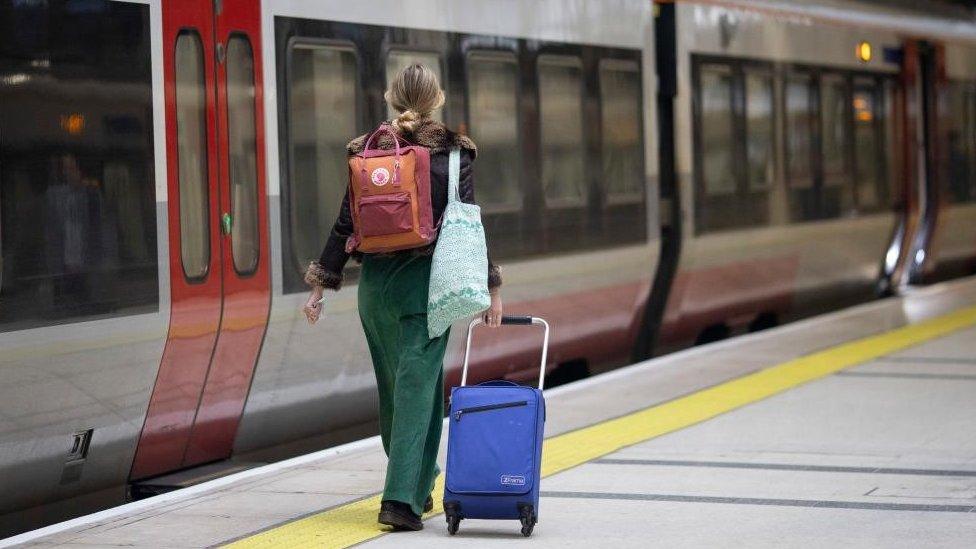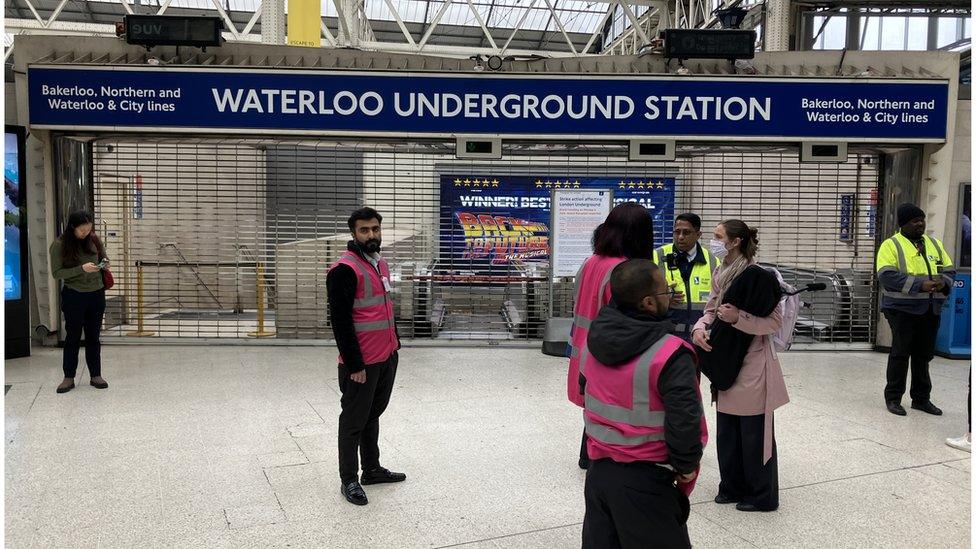Tube strike: Little or no service as walkout continues
- Published

No service is running on any of the Tube lines
Londoners are facing widespread transport disruption as strike action halts the Underground.
Transport for London's (TfL) website, external shows no services are running on any Tube lines.
RMT and Aslef members are involved in a dispute over job cuts, pensions and conditions. The RMT said cuts were a "political decision".
TfL's chief operating officer Glynn Barton urged the unions to call off the action.
TfL says all Tube lines are affected but there is a good service on the Elizabeth Line, the Docklands Light Railway (DLR) and the London Overground.
There is no service on the tube today due to strike action
However Tube station closures mean these services "will not be able to stop at those stations", and passengers intending to use some interchange stations may not be able to do so either.
Tram and bus services are also reported to be busier than normal.
Passengers are advised to allow more time for their journeys and check the latest information. People are also being encouraged to walk or cycle if they are able to.

Aslef are warning that more strike action could go ahead if negotiations fail
Aslef district organiser Finn Brennan told the BBC outside Brixton station that he is "genuinely sorry for the people affected."
"We are prepared to negotiate and talk about changes, but our members are rightly not prepared to accept change being imposed.
He added that further strikes are "very likely".
There have been seven London Underground strikes in the past 12 month, according to TfL.

Buses and trams were busier than usual
Tube and Elizabeth line services are expected to start much later than normal on Thursday morning due to the previous day's strike.
National rail strike action is also expected to have an impact in the capital on Thursday and into Friday morning, with an amended Elizabeth line timetable and possible further disruption to DLR, Elizabeth line and London Overground services.
Speaking at Prime Minister's Questions, Conservative MP for Harrow East, Bob Blackman asked Rishi Sunak if he would join him in condemning the strikes which he said "have brought misery to the travelling public", and also condemning London Mayor Sadiq Khan "for his failure to address this".
The prime minister said: "[Mr Blackman] is absolutely right about the misery being inflicted on Londoners by the incompetent running of TfL."
He said the mayor had received £6bn in additional funding for transport services, adding: "So for us to be in a situation that we find ourselves in today is simply unacceptable."
A spokesperson for the mayor of London said: "No one wants to see strikes and the disruption across the country this week is particularly bad news for many of the capital's businesses who are struggling with inflation and the cost of doing business.
"The mayor has repeatedly made clear that the government's insistence on including a review into pension reform as part of the emergency funding deal for TfL was unwarranted and had the potential to lead to this kind of industrial action."

The Elizabeth line is running with a good service but it is not stopping at every station
TfL's chief operating officer Glynn Barton apologised to customers and urged trade unions "to call off this action and continue to engage with us to avoid disruption to our customers".
But Mick Lynch, the RMT's general secretary, said: "Our members will never accept job losses, attacks on their pensions or changes to working conditions in order to pay for a funding cut which is the government's political decision."
He added staff "deserve decent pensions, job security and good working conditions, and the RMT will fight tooth and nail to make sure that's what they get".
A Department for Transport spokesperson said: "This government has committed over £6bn since the start of the pandemic to support London's transport network - how that money is spent is a decision for the mayor".

Analysis
Tom Edwards, BBC London transport correspondent

The Tube strike that has halted the network isn't about pay. The roots of it actually lie in the pandemic and the loss of passengers.
Then the government bailed out Transport for London (TfL) financially but there were strings attached.
Broadly TfL has to make £900m savings. Some 600 posts are being closed - the unions say that will leave stations with fewer staff which they say isn't safe.
TfL says passenger safety is always a priority. And the crucial issue: TfL has had to carry out a pension review.
Even carrying out the review has sparked the strikes, even though proposals for any change haven't been outlined. Changes will have to be agreed with the government.
Pensions are a red line for the unions and it is difficult to see how this will be resolved unless they stay as they are.

Follow BBC London on Facebook, external, Twitter , externaland Instagram, external. Send your story ideas to hellobbclondon@bbc.co.uk, external
- Published1 August 2023

- Published8 March 2023

- Published9 May 2024

- Published1 March 2023
